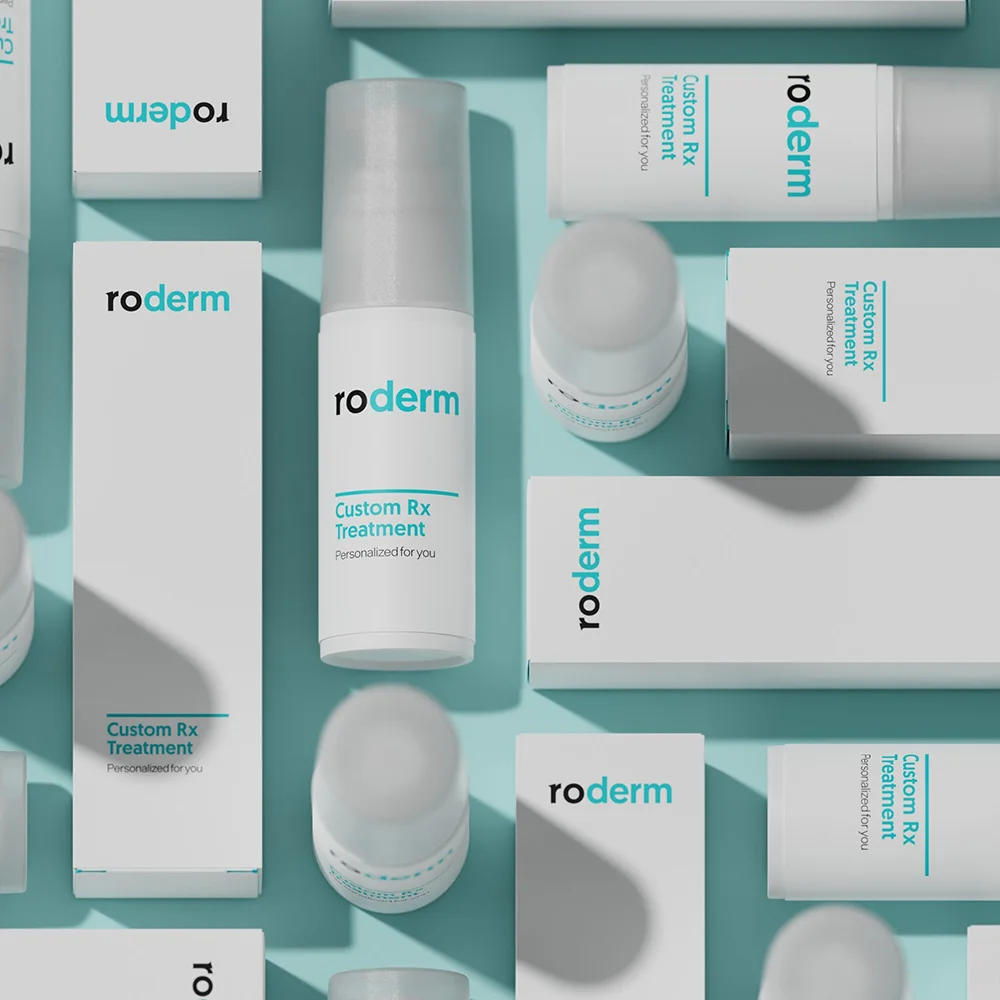Here's what we'll cover
Here's what we'll cover
You can find retinoids in many over-the-counter cosmetics and skincare products. But what about tretinoin? This topical retinoid is more powerful and only available by prescription. To minimize side effects, let’s cover how to use tretinoin safely to get healthier-looking skin.
How to use tretinoin
Tretinoin is an ingredient in many skincare products, from gels to ointments and creams. The goal with this medicine (for any skin issue) is to strike a good balance between its positive and negative effects. There’s an ongoing debate over prescribing tretinoin formulas with lower concentrations of tretinoin for more extended periods versus formulas with higher tretinoin concentrations for shorter periods—called "rapid retinisation" (Buchanan, 2016).
Your healthcare provider will guide you to optimize your skincare routine. They consider factors like your skin type (oily, dry, or sensitive skin, for example) and sensitivity. Your provider will also tell you whether you should use tretinoin every night or start by putting it on every other night—or wait even longer intervals.
You should always follow your provider’s instructions—here are some additional tips for using tretinoin cream:
Wash your face with a mild cleanser and gently pat dry. Avoid harsh soaps, as these can irritate your skin.
Apply a thin layer of tretinoin nightly before bed. Dab a bit into the chin, forehead, and cheeks. Gently spread the product over the whole area, spreading away from the corners of your mouth, eyes, and nose.
Use only the amount recommended by your provider—using more will not necessarily speed up your skin improvement and may worsen your skin irritation.
To lessen skin irritation with tretinoin, apply a good night cream or moisturizer afterward.
Tretinoin may cause dry, peeling skin at first; start by applying 2–-3 times a week as tolerated.
Make sure always to wear sunscreen (SPF 15+) and moisturize adequately.
For extended sun exposure, use SPF 50+ lotion, and reapply every two hours.
It may take up to 16 weeks for the treatment to take full effect.
Do not use if you are pregnant, trying to get pregnant (including if you’re on fertility treatment or undergoing IVF), or unsure if you are pregnant.
Tretinoin Important Safety Information: Read more about serious warnings and safety info.
How often to use tretinoin
Yes, you can use tretinoin every night, but you may not want to at first—and some people may never want to.
Tretinoin can cause skin irritation and peeling, especially when you first start using it. To combat this, start slowly—using tretinoin every third night, then every other night, then nightly as your skin tolerates (Leyden, 2017).
Exactly how quickly you ramp up depends on how you're tolerating the medication. Your healthcare provider can help you determine what dosing regimen is best for you.
What is tretinoin?
Tretinoin (retinoic acid) is a retinoid, a derivative of vitamin A. One common brand name is Retin-A. It's used as a powerful anti-acne and anti-aging medicine when applied to the skin (Yoham, 2020).
You can only get tretinoin with a prescription—it is strong and can cause serious side effects. Part of this medicine's power is that it starts working on the skin immediately after putting it on. In contrast, non-prescription (over-the-counter, OTC) retinol products are weaker and have to go through a conversion step after being applied to the skin (Zasada, 2019).
Tretinoin has been used for skin conditions for years. It helps skin conditions by increasing the cellular turnover of the skin. It quickly permeates skin layers and directs cell behavior, such as what job certain cells should do, how fast skin cells should grow, and when the cells should die (Yoham, 2020; Zasada, 2019).
Several strengths and formulations of tretinoin are available. A dermatologist or other healthcare professional who prescribes tretinoin will work with you to figure out which form and strength is best for you. They can also help you determine how often to apply the medicine for anti-acne, anti-wrinkle, or other purposes.
Benefits of tretinoin
The overall effect of regular use of tretinoin can be dramatic when it comes to many skin issues, but to get it to work for you—and avoid severe, unwanted reactions—follow directions from your healthcare provider carefully.
Benefits of tretinoin include:
Anti-aging effects
Tretinoin's anti-aging actions include diminishing fine lines and wrinkles and making skin smoother—it does this in many ways, including improving cell turnover. Tretinoin helps your skin get rid of the unhealthy or dead cells to reveal the healthy skin underneath. It also keeps your skin plump and fights the signs of aging by protecting and ultimately boosting collagen production and skin elasticity (Yoham, 2020; Zasada, 2019).
Anti-acne properties
Tretinoin works for acne by helping to keep skin pores unblocked. Many studies have shown that it is an effective acne treatment for both inflammatory and noninflammatory acne. It lessens the stickiness of dead skin cells that can clog pores and lead to breakouts like blackheads, whiteheads, and zits (Leyden, 2017).
Tretinoin also minimizes the size of pores and has anti-inflammatory effects to improve acne (Leyden, 2017). Lastly, it helps control the oily sebum produced by the skin's sebaceous glands (Zasada, 2019).
Decreases hyperpigmentation
Tretinoin can decrease hyperpigmentation—areas of darkened skin—by accelerating the turnover of skin cells in the area. It can also speed up the appearance of irregular skin pigmentation after acne, allowing for a more even skin tone (Zasada, 2019).
Risks and side effects of tretinoin
Tretinoin can cause serious side effects, including intense irritation, redness, burning sensation, itching, dryness, and skin flaking. Because these reactions can be especially intense when you first start tretinoin or increase the concentration of tretinoin, you can manage them in part by going slowly and letting your skin adjust to tretinoin over time (Yoham, 2020; Leyden, 2017).
Over days and weeks of use, your skin will build a level of tolerance to tretinoin. But in the meantime, discuss adjusting your tretinoin concentration or applying it less often for a while.
Safety issues with tretinoin
Tretinoin (and other retinoids) is not safe during pregnancy and has been associated with harm to the fetus. If you take any oral retinoid (like Accutane) and are of childbearing age, you need to be on two forms of contraception throughout treatment. Your provider may also require a negative pregnancy test before starting and have you check your pregnancy status regularly (Yoham, 2020).
For topical tretinoin, there are no specific contraceptive requirements. However, if you are pregnant or trying to become pregnant, you should avoid using the product.
Things to consider when using tretinoin
Apply tretinoin at night and stay out of the sun—Ultraviolet (UV) light from the sun lessens the power of the active ingredient. Also, tretinoin can make your skin more sensitive and more prone to sunburn. It's fine to keep using tretinoin in the sunny summer months. Just shield yourself with shade and sunblock as much as you can, even on non-sunny days.
Tretinoin can interact in unwanted ways with other skincare ingredients. Stay away from products that tend to dry out your skin while taking tretinoin. Avoid products containing spices, sulfur, lime, resorcinol, astringents, and salicylic acid (DailyMed, 2019).
Protect your face from intense wind or cold with a scarf or other face-covering; tretinoin can make you extra sensitive to weather extremes.
DISCLAIMER
If you have any medical questions or concerns, please talk to your healthcare provider. The articles on Health Guide are underpinned by peer-reviewed research and information drawn from medical societies and governmental agencies. However, they are not a substitute for professional medical advice, diagnosis, or treatment.
Buchanan, P. J., & Gilman, R. H. (2016). Retinoids: literature review and suggested algorithm for use prior to facial resurfacing procedures. Journal of Cutaneous and Aesthetic Surgery , 9(3), 139–144. doi: 10.4103/0974-2077.191653. Retrieved from https://www.ncbi.nlm.nih.gov/pmc/artic l es/PMC5064676/
Daily Med. (2019). Retin-A tretinoin cream; Retin-A tretinoin gel. Retrieved on Sept 30, 2021 from https://dailymed.nlm.nih.gov/dailymed/drugInfo.cfm?setid=9556d73d-c573-4e0a-9feb-764ce2d1107b
Leyden, J., Stein-Gold, L., & Weiss, J. (2017). Why topical retinoids are mainstay of therapy for acne. Dermatology and Therapy , 7 (3), 293–304. doi: 10.1007/s13555-017-0185-2. Retrieved from https://pubmed.ncbi.nlm.nih.gov/28585191/
Yoham, A. L. & Casadesus, D. (2020). Tretinoin. [Updated Dec. 5, 2020]. In: StatPearls [Internet]. Retrieved on Sept. 30, 2021 from https://www.ncbi.nlm.nih.gov/books/NBK557478/
Zasada, M., & Budzisz, E. (2019). Retinoids: active molecules influencing skin structure formation in cosmetic and dermatological treatments. Advances in Dermatology and Allergology , 36 (4), 392–397. doi: 10.5114/ada.2019.87443 . Retrieved from https://pubmed.ncbi.nlm.nih.gov/31616211/










